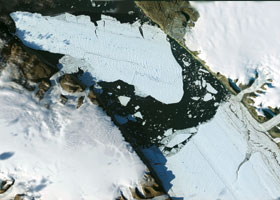Climate Politics

In mid-July a chunk of ice larger than the size of Manhattan broke off a glacier in Iceland and floated away. The same week, British police closed their criminal investigation into the 2009 “Climategate” email hacking case that had cast doubt on global warming—and as-persions on the reputations of some of the world’s foremost climate scientists.
U.K. police, up against a three-year deadline, announced July 18 that they didn’t have enough time to figure out who was behind the sophisticated hack, in which one or more attackers used proxy servers that crisscrossed the globe to remotely access a backup server and steal emails stored at the University of East Anglia’s Climatic Research Unit (CRU) about 110 miles northeast of London.
The emails, which exposed researchers in frank and sometimes unprofessional exchanges, were seized on by climate deniers as proof that climate change was one enormous hoax. Released in November 2009, just before the United Nations climate negotiations in Copenhagen, the trove of emails caused an international scandal, eclipsing the summit, which failed to produce a major accord on curtailing climate-changing greenhouse gas emissions
The scientists were later cleared of professional wrongdoing by several official investigations. And last July U.K. police exonerated the CRU staff from playing a roll in the hacking incident

Michael Mann, one of the climate scientists whose emails were stolen, calls the case a crime against humanity for its success in distracting world leaders from the increasingly urgent need to rein in fossil fuel emissions and stabilize the climate before global temperatures rise to irreversibly dangerous levels.
“The opportunity cost to society is immeasurable,” says Mann, who wrote at length about the email hacking case and the history of industry-backed attacks on him and other climate scientists in his 2012 book, The Hockey Stick and the Climate Wars (Columbia University Press).
While the scientists were exonerated, the controversy has had a lasting impact on public opinion, as Yale University’s “Six Americas” study chronicled in a series of opinion polls exploring Americans’ views on climate change. Researchers identified six schools of thought ranging from most to least concerned and tallied them up in segments: “alarmed,” “concerned,” “cautious,” “disengaged,” “doubtful,” and “dismissive.”
The Yale project’s first report in the fall of 2008, about a year before Climategate, estimated that just over half of those surveyed fell into the “alarmed” (18%) or “concerned” (33%) categories, while just 11% were “doubtful” and another 7% “dismissive.
The three surveys Yale has since released, including one published the same eventful week last summer when the Brits deep-sixed their investigation and a glacier named Petermann lost more than a Manhattan-sized piece of real estate, indicate that while concern about global warming is rising again, the skepticism also lingers. One in 10 people polled by Yale in March (the most recent survey reported on in July) fell into the “dismissive” category, while the fence-sitting “cautious“ represented 29%, up 10 percentage points since fall 2008.The next report, issued in January 2010, a few months after the scandal broke, found belief in climate change had taken a nosedive: Just 10% were “alarmed” and 29% “concerned,” while the “doubtful” were now 13% and the “dismissive” had grown to 16%.
Kevin Trenberth, another of the world’s leading scientists caught up in the email scandal, says the lingering distrust is frustratingly unfair. “[S]omehow the scientists are made to feel like the perpetrators,” he says. “I think I have come out of it fairly well as I did not say anything too egregious and I recognized up front that it was political and not really personal.”
While fallout continues, not all of it has been bad for climate scientists. Trenberth and others have emerged better prepared for the tumultuous politics of climate change. New organizations have formed to help them talk more clearly about scientific findings. And they are employing better metaphors and including sports analogies involving such all-American pastimes as baseball and skiing. It has all led to an unlikely turnabout: Today the scientists are coining phrases and crafting metaphors cribbed by the likes of New York Times columnist and Nobel Prize-winner Paul Krugman and writer-activist Bill McKibben.
Increasingly commonplace extreme weather events haven’t hurt their case either. By the time the climategate investigation wrapped, researchers were openly speculating that global warming was to blame for the Petermann Glacier’s unprecedented iceberg calving. “This is not part of natural variations anymore,” NASA glaciologist Eric Rignot told the Associated Press.
Meanwhile, in the U.S., much of the country was suffering through a second summer of drought and high temperatures. Severe storms knocked out electric power and left millions on the East Coast sweltering without lights or air conditioning.
“Extreme weather phenomena make it increasingly difficult for fossil fuel front groups to claim climate change isn’t real,” Mann says. “People are seeing the effects outside their windows.”
And Mann remains optimistic, saying there is still time to rein in greenhouse gas emissions and turn back the current trend before the planet is locked into dangerous warming, often estimated as two degrees Celsius higher than the pre-Industrial era.
“We’ve already warmed one degree and are probably locked in to another 0.5 degrees of warming,” he says. “So we’ve got another half a degree Celsius to work with.” Though he admits we “don’t have a whole lot of time,” as long as we peak emissions within the next couple of years and start reducing, there’s still a chance for a recovery. Using a ski slope analogy, Mann says: “A few years go, it [climate change impacts] could have been a bunny slope. Now we’re looking at more of a double diamond ski slope,” he says. “But there is hope.”

